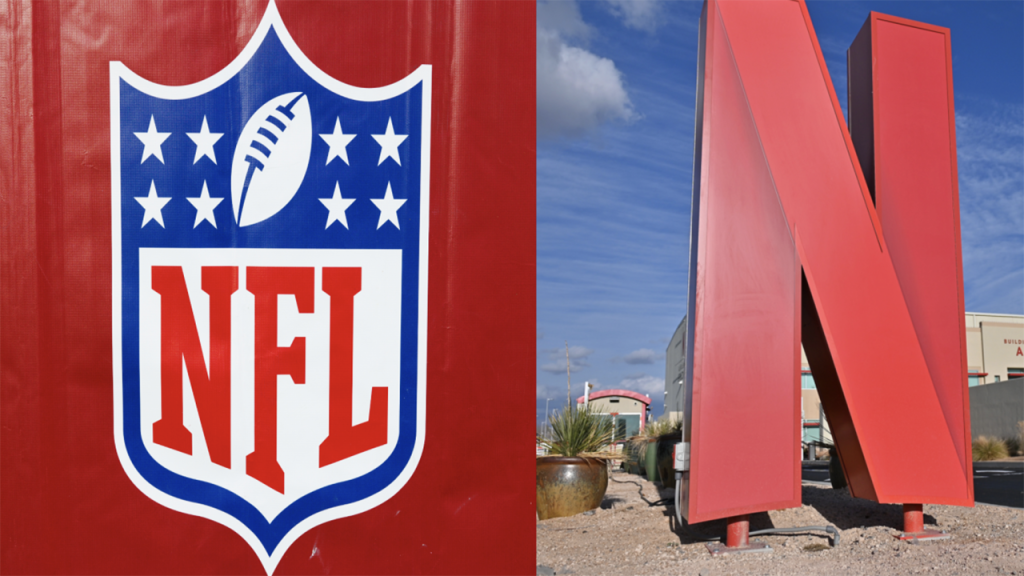The National Football League (NFL), in its continuous endeavor to expand its reach and accessibility, ventured into the realm of streaming by partnering with Netflix. This three-year deal marked a significant stride for the league, culminating in the highly anticipated Christmas Day doubleheader broadcast exclusively on the streaming platform. The move, however, was not without its challenges, as Netflix faced considerable pressure to deliver a seamless streaming experience following technical issues encountered during the live stream of a previous high-profile boxing match.
The build-up to the Christmas Day games was met with a mix of excitement and apprehension. While the streaming quality held up remarkably well during the initial stages, including the pre-game show and the first half of the Kansas City Chiefs versus Pittsburgh Steelers game, minor technical glitches did surface. Early on in the pre-game coverage, co-host Kay Adams experienced a brief microphone malfunction, leaving viewers momentarily without audio. Later, an unexpected advertisement for Netflix’s hit series “Squid Games” interrupted analyst Mina Kimes mid-sentence, momentarily disrupting the flow of the pre-game analysis. Although these hiccups were quickly resolved, they served as a reminder of the complexities of live streaming and the potential for unforeseen technical difficulties.
Once the game commenced, another noticeable error emerged: the on-screen scorebug incorrectly displayed the Pittsburgh Steelers as having only two remaining timeouts, despite being on their opening drive. This inaccuracy, while minor, raised concerns about the reliability of the real-time data being displayed. Fortunately, the error was rectified shortly after being identified. Despite these early challenges, the overall streaming quality remained stable throughout the first half, allowing viewers to enjoy the game without major disruptions. The reigning Super Bowl champions, the Kansas City Chiefs, held a 13-7 lead over the Pittsburgh Steelers at halftime.
The Netflix deal represents a significant investment for the streaming giant, reportedly costing around $150 million for the rights to broadcast these holiday games. The multi-year agreement secures Netflix the right to stream at least one holiday game in both 2025 and 2026, demonstrating a long-term commitment from both parties. This partnership underscores Netflix’s strategic move into live sports broadcasting, recognizing the massive viewership and engagement that live sporting events, particularly NFL games, command. This strategic shift complements Netflix’s existing sports-related content, including docuseries like “Quarterback” and “Receiver,” further solidifying its presence within the sports entertainment landscape.
The deal also reflects the NFL’s evolving strategy to reach a wider audience through diverse platforms. While maintaining traditional broadcast partnerships, the NFL’s foray into streaming services like Netflix allows it to tap into a younger, digitally savvy demographic that increasingly consumes content online. Furthermore, the agreement allows for games to be broadcast on local television in the competing teams’ home markets, ensuring accessibility for traditional viewers. Simultaneously, the NFL’s own streaming service, NFL+, offers fans in the U.S. the flexibility to watch games on their mobile devices, catering to the growing demand for on-the-go viewing.
This collaboration between the NFL and Netflix marks a significant development in the rapidly evolving media landscape. It signifies not only the NFL’s commitment to expanding its reach and embracing new technologies but also Netflix’s strategic move to establish itself as a major player in live sports streaming. The Christmas Day games served as a crucial test for this partnership, highlighting both the potential and the challenges of live streaming high-profile sporting events. While minor technical glitches occurred, the overall stability and quality of the stream showcased the capabilities of both the NFL and Netflix to deliver a compelling viewing experience to a global audience. The future of this partnership holds immense promise, as both organizations continue to innovate and adapt to the ever-changing demands of the sports entertainment industry.

